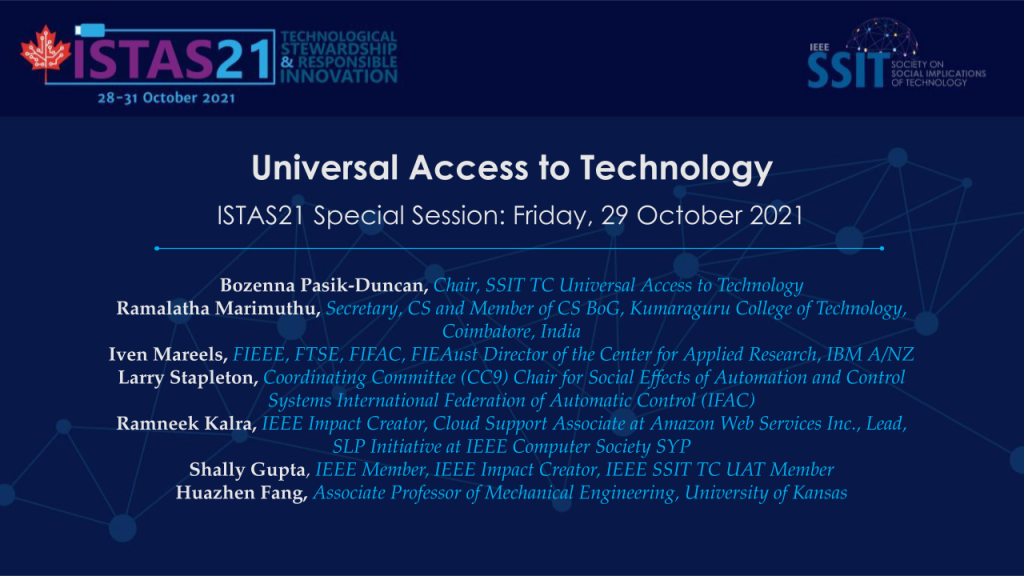
The Special Session “Universal Access to Technology” took place during IEEE International Symposium on Technology and Society (ISTAS) 2021 on 29 October 2021.
This session focuses on how society can actively reduce the digital divide which affects communities and individuals. Panelists discuss strategies for placing humanitarian concerns at the centre of all we do as we strive towards universal digital access.
Click here to watch the recording of this special session.
Organizer/Moderators:
Bozenna Pasik-Duncan, Chair, SSIT TC Universal Access to Technology; Member, SSIT BoG, University of Kansas, USA
Ramalatha Marimuthu, Secretary, CS and Member of CS BoG, Kumaraguru College of Technology, Coimbatore, India
Presenters:
Prof Iven Mareels, FIEEE, FTSE, FIFAC, FIEAust Director of the Center for Applied Research, IBM A/NZ
Larry Stapleton, Coordinating Committee (CC9) Chair for Social Effects of Automation and Control Systems International Federation of Automatic Control (IFAC)
Ramneek Kalra, IEEE Impact Creator, Cloud Support Associate at Amazon Web Services Inc., Lead, SLP Initiative at IEEE Computer Society SYP
Shally Gupta, IEEE Member, IEEE Impact Creator, IEEE SSIT TC UAT Member, Research Scholar, NSUT East Campus, Delhi-34, India
Huazhen Fang, Associate Professor of Mechanical Engineering, University of Kansas
Universal digital access to technology can be as seemingly straightforward as providing electricity access to a remote location or as overwhelmingly complicated as developing a healthcare system that provides immediate and secure access to medical experts, insurance companies, and all of their accompanying infrastructure. This session, featuring members of the SSIT Technical Committee on Universal Access to Technology, discusses how scholars, researchers, practitioners, and educators can actively reduce this digital divide which separates communities and individuals on the basis of ethnicity, religious conviction, sexuality, gender identity, income, age and in many other ways. Drawing on their professional experiences, panelists discuss strategies for placing humanitarian concerns at the centre of all we do as we strive towards universal digital access; they demonstrate how to carefully and ethically balance social, cultural and technological dimensions of society to the benefit of all people, particularly those living in rural and underserved areas; and they elaborate on the role of education, encouragement, and empowerment in the pursuit of these goals.






 JOIN SSIT
JOIN SSIT